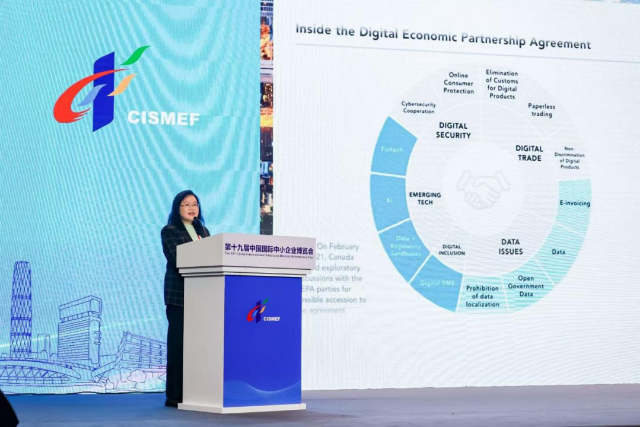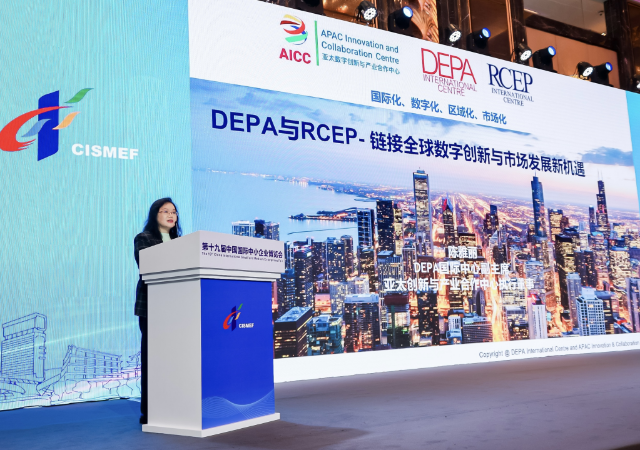
Alice Chan speaks at the China-ASEAN SME Industrial Chain Business Matching Activity in Guangzhou on November 15, 2024. (Photo: Guangzhou Institute of GBA)
"Flexible and inclusive DEPA will be beneficial to SMEs in China", noted Alice Chan, Vice Chairman of DEPA International Centre and Managing Director APAC Innovation and Collaboration Centre in Singapore at the China-ASEAN SME Industrial Chain Business Matching Activity kicking off in Guangzhou on Friday.
Before the event co-organized by the China Centre for Promotion of SME Development, MIIT, and the Guangzhou Institute of GBA, GDToday had an exclusive interview with Miss Chan.
She detailed the role of the Digital Economy Partnership Agreement (DEPA) in enhancing trade and investment opportunities for small and medium-sized enterprises (SMEs).
In addition, Miss Chan projected the collaboration between the GBA and Singapore in the digital economy, as well as GBA enterprises' possible obstacles to meeting the standards of the DEPA.
DEPA offers benefits for SMEs due to its high adaptability
Setting up from the government level, DEPA was initiated by Singapore, together with Chile and New Zealand, in June 2020. South Korea also joined as the fourth party in June last year.
As the first-ever digital-only trade agreement, the pact prepares for the future growth of the digital economy, including standards, adoption, and cross-border deployment with the support of the latest technologies.
Complementary to pivotal agreements such as the Regional Comprehensive Economic Partnership (RCEP) and the Comprehensive and Progressive Agreement for Trans-Pacific Partnership (CPTPP), DEPA, based on Miss Chan's observation, is especially beneficial to SMEs.
"Digital trade is something new. It allows SMEs, even startups, to have a chance to shape it, and there's a chance to evolve along the way," she noted.
Also, Miss Chan indicated that DEPA is a handler of different policies. They allow SMEs to level the playing field. SMEs and startups can participate and move along with the larger digital trade, which is very flexible, such as a sandbox. They also align with new frontier technologies such as AI and Web 3 applications.
Correspondingly, ASEAN is also facilitating economic integration. Miss Chan told GDToday that ten ASEAN countries also have a Digital Economy Framework Agreement (DEFA).
"All these create room for discussion and also inclusiveness, because they come from different levels, different countries, and different levels of readiness," she added.

Alice Chan speaks at the China-ASEAN SME Industrial Chain Business Matching Activity in Guangzhou on November 15, 2024. (Photo: Guangzhou Institute of GBA)
GBA and Singapore can be digital nodes to boost digital economy growth
China formally applied to join DEPA in November 2021. In 2023, the scale of China's digital economy reached 53.9 trillion yuan, representing 42.8% of GDP. Among GDP growth last year, digital economic growth contributed 66.45%.
As the hub of the digital economy nationwide, the added value of the digital economy in GBA reached 6.4 trillion yuan in 2023, accounting for 12.8% of the total, ranking first in China for six consecutive years.
According to Miss Chan, GBA and Singapore can function as two digital nodes since Singapore is an outlet to the international market, and the two can serve as a testing ground for integration. In this vein, many SMEs in GBA can embrace cutting-edge technologies to elevate them to the next level.
"At the opening ceremony this morning, we saw a lot of new initiatives to help SMEs in terms of digitalization, going overseas, and expansion. The SMEs can work with big players to be part of the supply chains," she pointed out.
Additionally, Singapore can also be a node for international partners as the country has many SMEs that account for a significant part of its economy as well. Its digital economy accounted for 17.7% of GDP in 2023 and provided 208,300 tech jobs.
The success of digital companies is largely attributed to innovation; they invest heavily in R&D. With the joining of GBA enterprises, the digital economy can become more robust.
"Therefore, the two will expand the applications and also level to synchronize with international standards," Miss Chen noted.
Free data flow lingers at the forefront of meeting DEPA standards
Generally, according to Miss Chan, one issue stands out for SMEs in meeting the DEPA standards, namely, free data flow among different countries.
DEPA pursues free data flow, especially cross-border data flow. However, data flow involves sovereignty on the internal side and geopolitical challenges on the external side.
"Each country has its own laws, varying in the degree of personal privacy protection, and consequently, the restrictions each government has adopted," noted Miss Chan.
A list of questions looms large for SMEs, such as the source of the data, the ownership of data, the category of data (digital product or digital asset), and the final product and chain that they promote to the market.
Given the status quo, Miss Chan advises SMEs not to put all their eggs in one basket.
"They must be nimble and dynamic enough when managing cross-border data. This applies to the legal side as well as cross-border data flow," she underscored.
Reporter: Zhang Ruijun
Editor: Yuan Zixiang, James, Shen He
















